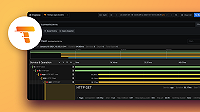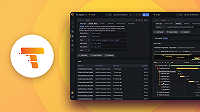Important: This documentation is about an older version. It's relevant only to the release noted, many of the features and functions have been updated or replaced. Please view the current version.
Tempo CLI
Tempo CLI is a separate executable that contains utility functions related to the tempo software. Although it is not required for a working installation, Tempo CLI can be helpful for deeper analysis or for troubleshooting.
Tempo CLI command syntax
The general syntax for commands in Tempo CLI is:
tempo-cli command [subcommand] [options] [arguments...]--help or -h displays the help for a command or subcommand.
Example:
tempo-cli -h
tempo-cli command [subcommand] -hRunning Tempo CLI
Tempo CLI is currently available as source code. A working Go installation is required to build it. It can be compiled to a native binary and executed normally, or it can be executed using the go run command.
Example:
./tempo-cli [arguments...]
go run ./cmd/tempo-cli [arguments...]Backend options
Tempo CLI connects directly to the storage backend for some commands, meaning that it requires the ability to read from S3, GCS, Azure or file-system storage. The backend can be configured in a few ways:
- Load an existing tempo configuration file using the
--config-file(-c) option. This is the recommended option for frequent usage. Refer to Configuration documentation for more information. - Specify individual settings:
--backend <value>The storage backend type, one ofs3,gcs,azure, andlocal.--bucket <value>The bucket name. The meaning of this value is backend-specific. Refer to Configuration documentation for more information.--s3-endpoint <value>The S3 API endpoint (i.e. s3.dualstack.us-east-2.amazonaws.com).--s3-user <value>,--s3-password <value>The S3 user name and password (or access key and secret key). Optional, as Tempo CLI supports the same authentication mechanisms as Tempo. See S3 permissions documentation for more information.
Each option applies only to the command in which it is used. For example, --backend <value> does not permanently change where Tempo stores data. It only changes it for command in which you apply the option.
Query API command
Call the tempo API and retrieve a trace by ID.
tempo-cli query api <api-endpoint> <trace-id>Arguments:
api-endpointURL for tempo API.trace-idTrace ID as a hexadecimal string.
Options:
--org-id <value>Organization ID (for use in multi-tenant setup).
Example:
tempo-cli query api http://tempo:3200 f1cfe82a8eef933bQuery blocks command
Iterate over all backend blocks and dump all data found for a given trace id.
tempo-cli query blocks <trace-id> <tenant-id>Note: can be intense as it downloads every bloom filter and some percentage of indexes/trace data.
Arguments:
trace-idTrace ID as a hexadecimal string.tenant-idTenant to search.
Options: See backend options above.
Example:
tempo-cli query blocks f1cfe82a8eef933b single-tenantList blocks
Lists information about all blocks for the given tenant, and optionally perform integrity checks on indexes for duplicate records.
tempo-cli list blocks <tenant-id>Arguments:
tenant-idThe tenant ID. Usesingle-tenantfor single tenant setups.
Options:
--include-compactedInclude blocks that have been compacted. Default behavior is to display only active blocks.
Output: Explanation of output:
IDBlock ID.LvlCompaction level of the block.ObjectsNumber of objects stored in the block.SizeData size of the block after any compression.EncodingBlock encoding (compression algorithm).VersBlock version.WindowThe window of time that was considered for compaction purposes.StartThe earliest timestamp stored in the block.EndThe latest timestamp stored in the block.DurationDuration between the start and end time.AgeThe age of the block.CmpWhether the block has been compacted (present when –include-compacted is specified).
Example:
tempo-cli list blocks -c ./tempo.yaml single-tenantList block
Lists information about a single block, and optionally, scan its contents.
tempo-cli list block <tenant-id> <block-id>Arguments:
tenant-idThe tenant ID. Usesingle-tenantfor single tenant setups.block-idThe block ID as UUID string.
Options:
--scanAlso load the block data, perform integrity check for duplicates, and collect statistics. Note: can be intense.
Example:
tempo-cli list block -c ./tempo.yaml single-tenant ca314fba-efec-4852-ba3f-8d2b0bbf69f1List compaction summary
Summarizes information about all blocks for the given tenant based on compaction level. This command is useful to analyze or troubleshoot compactor behavior.
tempo-cli list compaction-summary <tenant-id>Arguments:
tenant-idThe tenant ID. Usesingle-tenantfor single tenant setups.
Example:
tempo-cli list compaction-summary -c ./tempo.yaml single-tenantList cache summary
Prints information about the number of bloom filter shards per day per compaction level. This command is useful to estimate and fine-tune cache storage. Read the caching topic for more information.
tempo-cli list cache-summary <tenant-id>Arguments:
tenant-idThe tenant ID. Usesingle-tenantfor single tenant setups.
Example:
tempo-cli list cache-summary -c ./tempo.yaml single-tenantList index
Lists basic index info for the given block.
tempo-cli list index <tenant-id> <block-id>Arguments:
tenant-idThe tenant ID. Usesingle-tenantfor single tenant setups.block-idThe block ID as UUID string.
Example:
tempo-cli list index -c ./tempo.yaml single-tenant ca314fba-efec-4852-ba3f-8d2b0bbf69f1View index
View the index contents for the given block.
tempo-cli view index <tenant-id> <block-id>Arguments:
tenant-idThe tenant ID. Usesingle-tenantfor single tenant setups.block-idThe block ID as UUID string.
Example:
tempo-cli view index -c ./tempo.yaml single-tenant ca314fba-efec-4852-ba3f-8d2b0bbf69f1Generate bloom filter
To generate the bloom filter for a block if the files were deleted/corrupted.
Note: ensure that the block is in a local backend in the expected directory hierarchy, i.e. path / tenant / blocks.
Arguments:
tenant-idThe tenant ID. Usesingle-tenantfor single tenant setups.block-idThe block ID as UUID string.bloom-fpThe false positive to be used for the bloom filter.bloom-shard-sizeThe shard size to be used for the bloom filter.
Example:
tempo-cli gen bloom --backend=local --bucket=./cmd/tempo-cli/test-data/ single-tenant b18beca6-4d7f-4464-9f72-f343e688a4a0 0.05 100000The bloom filter will be generated at the required location under the block folder.
Generate index
To generate the index/bloom for a block if the files were deleted/corrupted.
Note: ensure that the block is in a local backend in the expected directory hierarchy, i.e. path / tenant / blocks.
Arguments:
tenant-idThe tenant ID. Usesingle-tenantfor single tenant setups.block-idThe block ID as UUID string.
Example:
tempo-cli gen index --backend=local --bucket=./cmd/tempo-cli/test-data/ single-tenant b18beca6-4d7f-4464-9f72-f343e688a4a0The index will be generated at the required location under the block folder.
Search blocks command
Search blocks in a given time range for a specific key/value pair.
tempo-cli search blocks <name> <value> <start> <end> <tenant-id>Note: can be intense as it downloads all relevant blocks and iterates through them.
Arguments:
nameName of the attribute to search for e.g.http.postvalueValue of the attribute to search for e.g.GETstartStart of the time range to search: (YYYY-MM-DDThh:mm:ss)endEnd of the time range to search: (YYYY-MM-DDThh:mm:ss)tenant-idTenant to search.
Options: See backend options above.
Example:
tempo-cli search blocks http.post GET 2021-09-21T00:00:00 2021-09-21T00:05:00 single-tenant --backend=gcs --bucket=tempo-trace-dataWas this page helpful?
Related resources from Grafana Labs



